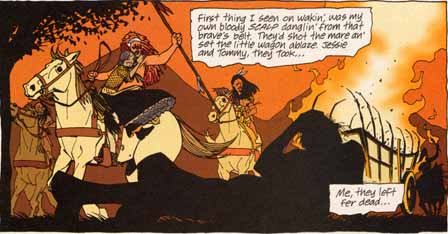By Kee Malesky
In its literal and original sense, as you would expect, the term was used in the 19th century to describe the activities of Native Americans:
“The acting commissioner of Indian affairs to-day received a telegram from Agent Roorke of the Klamath (Oregon) agency, dated July 6, in which he says: ‘No Indians are off the reservation without authority. All my Indians are loyal and peaceable, and doing well.” (Baltimore Sun, July 11, 1878)
Many of the news articles that used the term in a literal sense in the past were also expressing undisguised contempt and hatred, or, at best, condescension for Native Americans—“shiftless, untameable…a rampant and intractable enemy to civilization” (New York Times, Oct. 27, 1886).
Native Reaction to the Term
Rob Capriccioso, citizen of the Sault Tribe of Chippewa Indians, and Washington D.C. Bureau Chief for Indian Country Today writes:
“I bristle when I hear the phrase because many of the people who use it nonchalantly have likely never thought about its origin, nor have they probably ever visited a reservation.”
“It’s not about political correctness, either, it’s about helping the majority realize that there is a minority point-of-view that holds weight that the majority is giving too little credence. To me, there are indeed many more offensive words involving American Indians than this phrase—including the name of the Washington football team—but I believe it is the common use of phrases like ‘off the reservation’ that allows people to end up being comfortable going further—to the point of using a slur to name a football team that supposedly honors Indians, but not realizing that it is actually a slur.”
It's wrong because it conveys a 19th-century impression of Natives. That they should stay on the reservation where we put them. That they're dangerous if they leave the reservation with their marauding, murderous ways. That the only way to turn them into peaceful Americans is to tame them like animals in cages.
Even if those using the phrase aren't referring to actual Natives, they're reinforcing an outdated image. Today, 70% of Natives live off the reservation, so leaving a rez isn't an issue. They're already well-integrated into society with no major problems. To imply they've done something wrong or are out of control is stereotypical.
To be sure, "off the reservation" is a minor wrong. It's akin to "too many chiefs" or "low man on the totem pole," which are also minor problems. Still, people should think about their choice of words. They should avoid phrases like this one.
For more on the subject, see Commissioner: Indians Should Get Off the Rez.


No comments:
Post a Comment